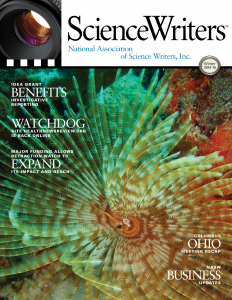By Michelle Nijhuis
In March 2011, High Country News was awarded a $2,500 NASW Idea Grant to fund customized, in-depth training in investigative reporting techniques for its editorial staff. In the summer of 2011, Doug Haddix of Investigative Reporters and Editors spent two days at the magazine’s headquarters in Paonia, Colo., and gave a crash course in investigative story planning and execution. For some HCN writers and editors, it was a useful introduction to investigative reporting; for others, it was a welcome refresher. For all of us, it was a rare chance to take part in training as a staff and talk as a group about how lessons might be put to use. Over the past three years, the training and the discussions it sparked have influenced the magazine in many small and large ways.In December 2012, Stephanie Paige Ogburn, then HCN’s online editor, filed a single Freedom of Information request for reports of harassment of BLM employees in southern Utah. She turned up several incidents, including one in which an all-terrain-vehicle driver, apparently angry over the BLM (Bureau of Land Management) banning motors on some trails, used his machine to tear up the yard of a BLM employee’s home.
In January 2014, Ray Ring, then HCN’s senior editor, expanded the investigation, seeking reports from more than a hundred BLM and Forest Service offices from Alaska to New Mexico. The Reporters Committee for Freedom of the Press, in the Washington, D.C., area, offered guidance on tracking down public records, and Marshall Swearingen, HCN’s Freedom of Information project manager, handled most of the communication with the agencies. From thousands of pages of official reports, Swearingen and Ring culled dozens of the worst incidents and summarized each one. The results and analysis, presented in HCN’s October package “[Defuse the West](http://hcn.org/issues/46.18/ defuse-the-west),” show a region-wide pattern of hostility toward government employees and explore its political and cultural roots.
The staff is now planning a follow-up based on the many reader tips received since the package’s publication. We’re grateful to NASW for its part in supporting this ongoing investigation and analysis of a pressing environmental — and social — issue in the American West.
Freelance writer Michele Nijhuis is a contributing editor to High Country News. She writes about science, the environment, and the American West.
(NASW members can read the rest of the Winter 2014-15 ScienceWriters by logging into the members area.) Free sample issue. How to join NASW.

